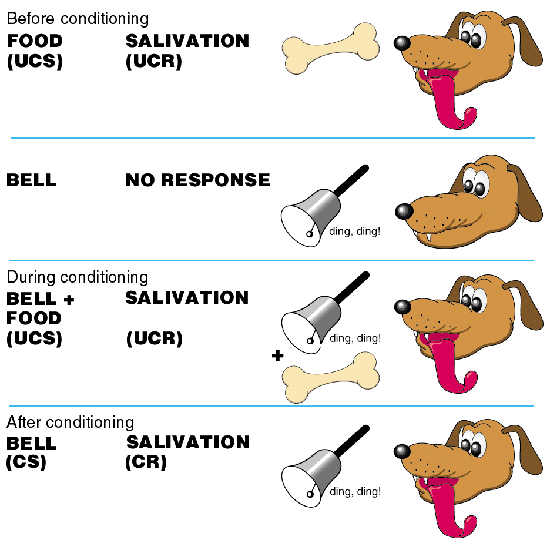
Search
Statistics
We have 222 registered usersThe newest registered user is raheelmemon
Our users have posted a total of 1140 messages in 613 subjects
If you are seeing this, you have attempted to link to the UpToDate widget but are experiencing a problem. Please visit UpToDate for more information.

Classic Conditioning Vs Operant Conditioning
FORUM FOR PSYCHIATRY RESIDENTS :: Psychiatry :: Psychiatry-Neurology-Psychology discussion :: Psychiatry In Depth
Page 1 of 1
 Classic Conditioning Vs Operant Conditioning
Classic Conditioning Vs Operant Conditioning
Classic Conditioning Vs Operant Conditioning
| Classic Conditioning | Operant Conditioning |
| Classical conditioning involves pairing a previously neutral stimulus (such as the sound of a bell) with an unconditioned stimulus (the taste of food). This unconditioned stimulus naturally and automatically triggers salivating as a response to the food, which is known as the unconditioned response. After associating the neutral stimulus and the unconditioned stimulus, the sound of the bell alone will start to evoke salivating as a response. The sound of the bell is now known as the conditioned stimulus and salivating in response to the bell is known as the conditioned response. (check pic below) | Operant conditioning focuses on using either reinforcement or punishment to increase or decrease a behavior. Through this process, an association is formed between the behavior and the consequences for that behavior. For example, imagine that a trainer is trying to teach a dog to fetch a ball. When the dog successful chases and picks up the ball, the dog receives praise as a reward. When the animal fails to retrieve the ball, the trainer withholds the praise. Eventually, the dog forms an association between his behavior of fetching the ball and receiving the desired reward. |
| Involves placing a neutral signal before a reflex | Involves applying reinforcement or punishment after a behavior |
| Focuses on involuntary, automatic behaviors | Focuses on strengthening or weakening voluntary behaviors |
One of the simplest ways to remember the differences between classical and operant conditioning is to focus on whether the behavior is involuntary or voluntary. Classical conditioning involves making an association between an involuntary response and a stimulus, while operant conditioning is about making an association between a voluntary behavior and a consequence.

FORUM FOR PSYCHIATRY RESIDENTS :: Psychiatry :: Psychiatry-Neurology-Psychology discussion :: Psychiatry In Depth
Page 1 of 1
Permissions in this forum:
You cannot reply to topics in this forum

» L-Methylfolate: Who Will benefit
» Vitamins & Supplements in Clinical Practice.
» Imaging Biomarkers for Outcomes in Mild TBI
» Q.5 Clozapine Neutopenia
» Treating Disorders!
» Cortical Abnormalities in Adults & Adolescents with MDD
» Efficacy of Antipsychotics in Pediatric Acute Mania
» Obsessive Compulsive Disorder in Adults: Which Treatment is Better?